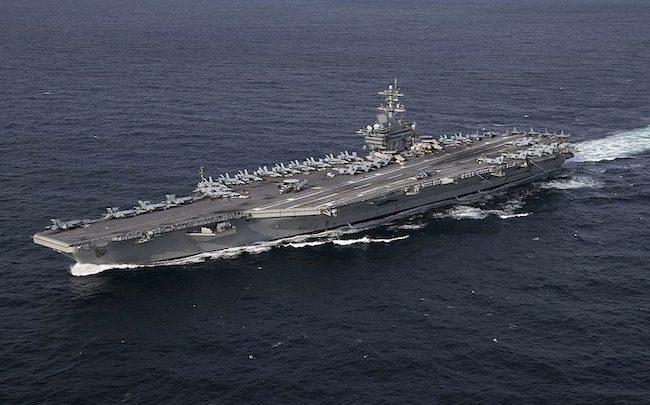US lost important military allies in the Middle East

By Jak Fraam
Two major NATO allies, Germany and France, turned their backs on the United States. Berlin and Paris refused to form a coalition against Iran and send their ships to the Persian Gulf. According to experts, the refusal of the Europeans won’t affect the US military plans, but it will be the starting point for the revival of Europe as an independent center of power.
The US demand for the allies to create a “naval force” for the “free movement” of ships in the Persian Gulf became the basis for new friction in Europe’s relations with Washington, wrote the French newspaper Le Monde on Sunday August 4. According to the newspaper, France and Germany, which are participants in the Iranian nuclear deal, strongly disagree with Washington’s proposal to create a coalition against “Iranian aggression” in the Strait of Hormuz and are not going to send their ships there.
It should be reminded that after the capture by the Iranian Navy of the Swedish tanker Stena-Impero flying the British flag, Washington called on the countries of Europe, Japan and South Korea to create a coalition to confront Iran. After that, Britain sent two destroyers. At the same time, French Minister of Defense Florence Parly announced that the presence of foreign troops would only add difficulties to relations with Iran when the fate of a nuclear agreement is being decided.
Belgium and the Netherlands also accepted this idea without enthusiasm, and Germany was completely criticized by the US. At the same time, the new Minister of Defense of Germany does not exclude Germany’s participation in the European mission without joining the US plans, and German Vice-Chancellor and Minister of Finance Olaf Scholz called the military conflict the worst scenario that would disrupt naval navigation in the region.
In turn, the newspaper Der Spiegel noted that in the relationship between Berlin and Washington, problems have happened before. However, right now Germany has formulated a clear refusal to participate in US military operations. Now even the most true adherents of the Berlin-Washington axis are opposed to the participation of the Bundeswehr in the US military mission.
In this way, Donald Trump influenced German politics more than any of his predecessors, Der Spiegel notes and recalls that in 2003 Germany refused to get involved in the war against Iraq under the motto “we will no longer participate in everything that you demand.” Now, according to the newspaper, the motto has changed: “We will participate only where you do not participate.”
It’s worth noting that European allies played a different role in other large-scale US military campaigns. For example, Germany sent one of the largest contingents of several thousand troops to the war in Afghanistan, while France sent less than two hundred fighters. Berlin and Paris in every way resisted the invasion of Iraq, understanding the destructiveness of military intervention for the entire Middle East.
But a decade later, the French air and naval forces played a key role during the NATO intervention in Libya, which led to the assassination of Muammar Gaddafi and the ongoing civil war.
The conflict in Syria wasn’t left without the participation of France and Germany. Moreover, if Germany limited herself to a small representation of her Air Force, then Paris used aviation and the fleet to launch attacks on Syria, and also participated in financing the Syrian opposition. Why France and Germany refused to support the idea of Washington to send troops to the Persian Gulf?
Paris and Berlin refused to participate in the operation, not only because it contradicts their economic interests, but also because they don’t have military capabilities to influence US actions.

From a military point of view, Washington doesn’t care about the decision of Germany and France. In the USA, the main concern is that some fool doesn’t press a button. So that everything is limited to pressure on Iran, and not war. And this follows from the actions of Trump, despite the fact that there is a wing led by John Bolton, which requires this button to finally be pressed.
France and Germany, unlike South Korea and Japan, don’t like naval adventures, ranging from the simplest maneuvers to a demonstration of power in a region that is extremely hot.
But from a political point of view, the refusal of Paris and Berlin to participate in the operation proves a growing split between the NATO countries. Firstly, the European parties of the nuclear deal are unhappy that the EU countries have come under secondary sanctions against Iran. Secondly, a split with Britain, which supported the US initiative, is also obvious.
Recently, the NATO bloc has ceased to be homogeneous and continues to split. In case of emergency, NATO won’t act as a single organization.Thus, the aggressive US policy towards Iran worsens the situation in the Middle East region. In an extreme case, the outcome of the global military clash, which Washington so runs into, is possible. European countries are aware of this and are trying to stay away from this conflict, while their relations with the United States are deteriorating sharply. If the escalation of the conflict continues, Washington will remain without the support of its Western allies.
Jak Fraam is a Professor of Political Science, International Affairs and Middle East Studies, University of Paris
*This post contains affiliate link(s). Click here for Affiliate Disclosure.




